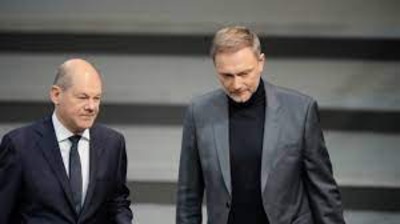Germany’s Finance Minister, Christian Lindner, emphasized the need for a fair distribution of financial burdens among EU member states in supporting Ukraine. Lindner argued that Germany alone cannot shoulder the entirety of Ukraine’s defense costs, especially in the absence of US aid and escalating demands from Kiev for military assistance post a failed counteroffensive.
Speaking at an event organized by the German Eastern Business Association, Lindner underscored the importance of a collective effort, stating, “It cannot be that Germany does more to help Ukraine so that others do less.” This statement reflects the minister’s stance on the equitable sharing of responsibilities among EU nations.
Join us on Telegram: https://t.me/tfiglobal
The urgency of addressing this issue arises as the financial strain on Germany becomes apparent, necessitating increased contributions from other European countries.
According to data released by Germany’s Federal Statistical Office (Destatis) last week, the country’s economy contracted by 0.3% in the past year.
Germany has been facing significant protests since early January, triggered by farmers blocking roads and highways in response to Berlin’s announcement of reducing agricultural subsidies. This decision followed closely on the heels of Germany’s commitment to nearly double its support for Ukraine in 2024.
Chancellor Olaf Scholz revealed last week that Germany plans to allocate over €7 billion ($7.6 billion) for military aid to Ukraine this year. Notably, Germany has been a substantial contributor, providing Kiev with nearly $23 billion in aid between February 2022 and November 2023, making it the second-largest donor after the United States, as reported by the Kiel Institute for World Economy.
Read More: Germany’s Economic Rollercoaster: Was Playing Superhero a Costly Mistake?
Expressing the need for collective action, Scholz called on Germany’s “allies in the European Union to strengthen their efforts” in funding Ukraine’s military. He voiced his confidence that the EU would agree to a €50 billion aid package for Ukraine during an upcoming emergency summit scheduled for February 1, despite acknowledging some member states’ reluctance in providing generous support to Ukraine.
Washington recently confirmed a suspension of its assistance, citing prolonged political disagreements between Republicans and Democrats. A proposed $60 billion aid package, comprising weapons and military equipment for Kiev, faces obstruction from the GOP. The Republicans insist that President Biden addresses issues related to mass illegal immigration before approving the aid package.
German Defense Minister Boris Pistorius has conveyed apprehensions regarding excessive arms donations to Kiev, expressing concerns about potential weakening of Berlin’s own military forces. Pistorius emphasized the necessity for Berlin to carefully balance its commitments, stating that the nation must “keep an eye on its own defense capabilities.”
Read More: Germany’s Top Defense Secrets Exposed – Is War Inevitable?
Pistorius, who previously emphasized the urgency for European nations to bolster their military capabilities in anticipation of potential confrontations with Russia, dismissed criticisms regarding Germany’s support for Ukraine. He highlighted Germany’s position as the second-largest contributor to Kiev, following the United States. However, he clarified that fulfilling Ukraine’s request for German-made long-range Taurus cruise missiles is currently unfeasible.
“We have so far delivered everything that is possible,” Pistorius asserted, underscoring Germany’s careful consideration of the potential impact of each shipment to Ukraine.
This cautious approach reflects the Minister’s assertion that an uncompromising stance in supporting Ukraine may leave Germany vulnerable, as going “all in” for Ukraine could result in a defense deficit.
Following the setback of Kiev’s failed counteroffensive, Ukrainian officials are intensifying their requests for additional weaponry from Western supporters. The aftermath of the unsuccessful military operation has prompted heightened pressure on Western allies to provide more arms to Ukraine.
Read More: Ukraine Aid Sparks Farmer Fury in Germany
In response to the ongoing arms support, Russia has consistently voiced criticism, contending that the influx of Western weapons into Ukraine serves to unnecessarily prolong the conflict without altering its ultimate outcome. Moscow’s argument suggests a belief that increased arms shipments to Ukraine may not significantly impact the overall trajectory of the conflict, and, according to Russia, could contribute to prolonged hostilities.
This perspective underscores the contrasting views between Western backers, who are inclined to provide military aid to Ukraine, and Russia, which questions the effectiveness and consequences of such assistance in the context of the ongoing conflict.
